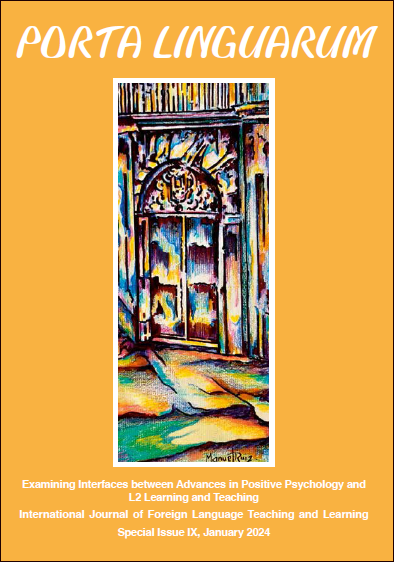Introduction
DOI:
https://doi.org/10.30827/portalin.viIX.29918Palabras clave:
-Resumen
-
Descargas
Citas
Derakhshan, A. (2022a). The “5Cs” positive teacher interpersonal behaviors: Implications for learner empowerment and learning in an L2 context. Springer. https://link.springer.com/book/9783031165276
Derakhshan, A. (2022b). Revisiting research on positive psychology in second and foreign language education: Trends and directions. Language Related Research, 13(5), 1–43. https://doi.org/10.52547/LRR.13.5.1
Derakhshan, A., & Fathi, J. (2023). Grit and foreign language enjoyment as predictors of EFL learners’ online engagement: The mediating role of online learning self-efficacy. The Asia-Pacific Education Researcher, 1–11. https://doi.org/10.1007/s40299-023-00745-x
Derakhshan, A., Dewaele, J. M., & Azari Noughabi, M. (2022). Modeling the contribution of resilience, well-being, and L2 grit to foreign language teaching enjoyment among Iranian English language teachers. System, 190, 102890. https://doi.org/10.1016/j.system.2022.102890
Derakhshan, A., Greenier, V., & Fathi, J. (2023). Exploring the interplay between a loving pedagogy, creativity, and work engagement among EFL/ESL teachers: A multinational study. Current Psychology, 42(26), 22803–22822. https://doi.org/10.1007/s12144-022-03371-w
Derakhshan, A., Solhi, M., & Azari Noughabi, M. (2023). An investigation into the association between student-perceived affective teacher variables and students’ L2-grit. Journal of Multilingual and Multicultural Development. https://doi.org/10.1080/01434632.2023.2212644
Derakhshan, A., Wang, Y., Wang, Y., & Ortega-Martín, J. L. (2023). Towards innovative research approaches to investigating the role of emotional variables in promoting language teachers' and learners' mental health. International Journal of Mental Health Promotion, 25(7), 823–832.https://doi.org/10.32604/ijmhp.2023.029877
Dewaele, J. M., & Li, C. (2021). Teacher enthusiasm and students’ social-behavioral learning engagement: The mediating role of student enjoyment and boredom in Chinese EFL classes. Language Teaching Research, 25(6), 922–945.
https://doi.org/10.1177/13621688211014538
Dewaele, J.M., Chen, X., Padilla, A.M., & Lake, J. (2019). The flowering of positive psychology in foreign language teaching and acquisition research. Frontiers in Psychology, 10, https://doi.org/10.3389/fpsyg.2019.02128
Elahi Shirvan, M., Yazdanmehr, E., Taherian, T., Kruk, M., & Pawlak, M. (2023). Boredom in practical English language classes: A longitudinal confirmatory factor analysis-curve of factors model. Applied Linguistics Review, 14(5), 1345–1366. https://doi.org/10.1515/applirev-2021-0073
Fredrickson, B. L. (2001). The role of positive emotions in positive psychology: The broaden and build theory of positive emotions. American Psychologist, 56(3), 218–226.
Fredrickson, B. L. (2003). The value of positive emotions. American Scientist, 91(4), 330–335.
Jin, Y., Dewaele, J. M., & MacIntyre, P. D. (2021). Reducing anxiety in the foreign language classroom: A positive psychology approach. System, 101, 102604. https://doi.org/10.1016/j.system.2021.102604
Kruk, M., & Pawlak, M. (2022). Understanding emotions in English language learning in virtual worlds. Routledge.
Kruk, M., Pawlak, M., Taherian, T., Yüce, E., Shirvan, M. E., & Barabadi, E. (2023). When time matters: Mechanisms of change in a mediational model of foreign language playfulness and L2 learners’ emotions using latent change score mediation models. Studies in Second Language Learning and Teaching, 13(1), 39–69. https://doi.org/10.14746/ssllt.37174
Li, C., Pawlak, M., & Kruk, M. (2023). Achievement emotions and control-value appraisals in foreign language learning. Journal of Multilingual and Multicultural Development, 1–15. https://doi.org/10.1080/01434632.2023.2183961
Liu, H., & Song, X. (2021). Exploring “Flow” in young Chinese EFL learners’ online English learning activities. System, 96, 102425. https://doi.org/10.1016/j.system.2020.102425.
MacIntyre, P. D. (2016). So far so good: An overview of positive psychology and its contributions to SLA. In D. Gabrys-Barker & D. Gałajda (Eds.), Positive psychology perspectives on foreign language learning and teaching (pp. 3–20). Springer.
MacIntyre, P. D. (2021). Exploring applications of positive psychology in SLA. In K. Budzinska & O. Majchrzak (Eds.), Positive psychology in second and foreign language education (pp. 3–17). Springer.
MacIntyre, P., & Gregersen, T. (2012). Emotions that facilitate language learning: The positive-broadening power of the imagination. Studies in Second Language Learning & Teaching, 2(2), 193–213. https://doi.org/10.14746/ssllt.2012.2.2.4
Mercer, S. (2018). Psychology for language learning: Spare a thought for the teacher. Language Teaching, 51(4), 504–525. https://doi.org/10.1017/S0261444817000258
Mercer, S., & MacIntyre, P. D. (2014). Introducing positive psychology to SLA. Studies in Second Language Learning and Teaching, 4(2), 153–172. https://doi.org/10.14746/ssllt.2014.4.2.2
Pan, Z., Wang, Y., & Derakhshan, A. (2023). Unpacking Chinese EFL students’ academic engagement and psychological well-being: The roles of language teachers’ affective scaffolding. Journal of Psycholinguistic Research, 1–21. https://doi.org/10.1007/s10936-023-09974-z
Pawlak, M., & Kruk, M. (2022). Individual differences in computer assisted language elarning research. Routledge.
Pawlak, M., Kruk, M., Csizér, K., & Zawodniak, J. (2023). Investigating in-class and after-class boredom among advanced learners of English: intensity, interrelationships and learner profiles. Applied Linguistics Review. https://doi.org/10.1515/applirev-2022-0150
Pawlak, M., Zawodniak, J., & Kruk, M. (2020). Boredom in the foreign language classroom: A micro-perspective. Springer.
Plonsky, L., Sudina, E., & Teimouri, Y. (2022). Language learning and emotion. Language Teaching, 55(3), 346–362. https://doi.org/10.1017/S0261444821000434
Qin, X. (2024). The applicability of positive psychology in social media-based language learning. Language Related Research, 15(1), 87–118. http://dx.doi.org/10.29252/LRR.15.1.4
Seligman, M. (2018). PERMA and the building blocks of well-being. The Journal of Positive Psychology, 13(4), 333–335.
Seligman, M. E., & Csikszentmihalyi, M. (2000). Positive psychology. American Psychologist, 55(1), 5–14.
Solhi, M., Derakhshan, A., & Ünsal, B. (2023). Associations between EFL students’ L2 grit, boredom coping strategies, and emotion regulation strategies: A structural equation modeling approach. Journal of Multilingual and Multicultural Development, 1–20. https://doi.org/10.1080/01434632.2023.2175834
Wang, Y. (2023). Probing into the boredom of online instruction among Chinese English language teachers during the Covid-19 pandemic. Current Psychology. https://doi.org/10.1007/s12144-022-04223-3.
Wang, Y. L., Derakhshan A., & Pan, Z. (2022). Positioning an agenda on a loving pedagogy in second language acquisition: Conceptualization, practice, and research. Frontiers in Psychology, 13, 894190. https://doi.org/10.3389/fpsyg.2022.894190
Wang, Y., L., Derakhshan, A., & Zhang, L. J. (2021). Researching and practicing positive psychology in second/foreign language learning and teaching: The past, current status and future directions. Frontiers in Psychology, 12, 1–10. https://doi.org/10.3389/fpsyg.2021.731721
Zare, J., Aqajani Delavar, K., & Derakhshan, A. (2023). The impact of altruism on the emotions and English summary writing skills of L2 learners: An intervention study in light of positive psychology. Language Teaching Research. https://doi.org/10.1177/13621688231151632
Zawodniak, J., Kruk, M., & Pawlak, M. (2023). Boredom as an aversive emotion experienced by English majors. RELC Journal, 54(1), 22–36. https://doi.org/10.1177/0033688220973732
Zhang, L. J., Saeedian, A., & Fathi, J. (2022). Testing a model of growth mindset, ideal L2 self, boredom, and WTC in an EFL context. Journal of Multilingual and Multicultural Development. https://doi.org/10.1080/01434632.2022.2100893



















